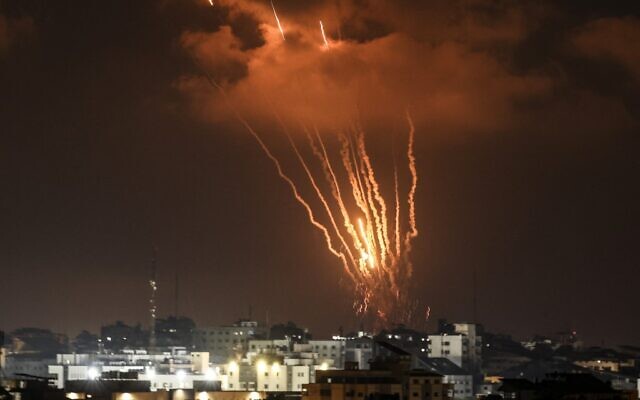The Israel Defense Forces said Saturday it was prepared for a “week of fighting” against the Palestinian Islamic Jihad terror group in the Gaza Strip, as over 200 rockets were launched at Israel from the coastal enclave, with the central city of Modiin targeted as well as southern cities and towns.
The military launched Operation Breaking Dawn with airstrikes in Gaza on Friday afternoon in response to what officials said was an ongoing “concrete” threat by PIJ to target Israeli civilians and soldiers.
Islamic Jihad then began to fire relentless barrages of rockets at Israeli communities in southern and central Israel, with the rocket fire continuing into Saturday afternoon.
In the opening round of Israeli strikes, the military killed one of PIJ’s senior commanders, Tayseer Jabari, whom officials said was planning to attack Israeli civilians near the border. Jabari replaced Baha Abu al-Ata as the group’s commander in northern Gaza after the latter was killed in an Israeli strike in 2019.
In a briefing to reporters Saturday morning, military spokesperson Ran Kochav said the IDF had struck some 40 Islamic Jihad targets in the Gaza Strip, including six weapon manufacturing workshops, two weapons storage sites, six observation posts and five rocket-launching positions.
Later on Saturday, the IDF said it had struck several more PIJ sites, as well as a terror cell en route to launch mortars at towns in southern Israel.
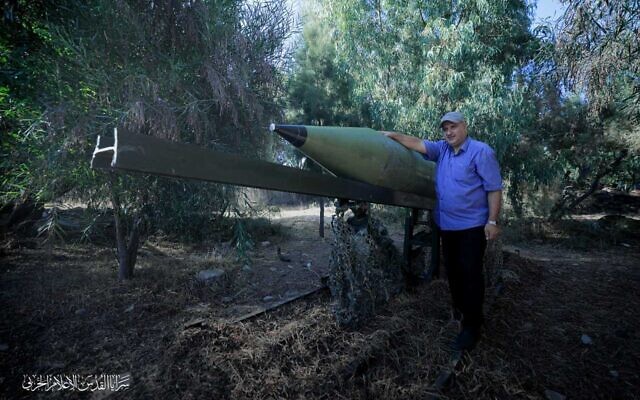
Palestinian Islamic Jihad’s northern Gaza commander Tayseer Jabari in an undated photo released by the terror group. (Courtesy)
Kochav said Jabari was “not the final target in Palestinian Islamic Jihad,” hinting that Israeli operations would continue.
The IDF said there were currently “no negotiations underway” to bring an end to the violence.
“We are preparing for a week of fighting under the guidance of the political echelon. If we can shorten [the fighting]we will,” Kochav said.
The military said the Iron Dome missile defense system has demonstrated a 95 percent success rate at intercepting the projectiles fired toward Israeli towns by Gaza-based terror groups.
Kochav said around 30 of the rockets fired by terrorists did not cross the border into Israel and landed within the enclave; another 60 of the rockets were intercepted by the Iron Dome, and the remainder landed in open areas.
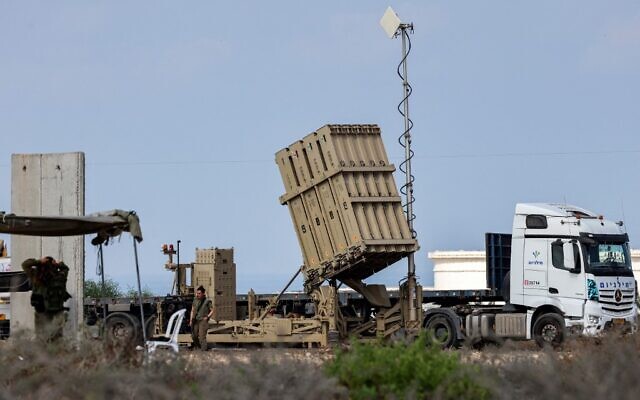
Israeli soldiers stand near a battery of the Iron Dome missile defense system in southern Israel on August 6, 2022. (Jack Guez/AFP)
Defense Minister Benny Gantz meanwhile instructed the military to continue offensive actions against the PIJ “with an emphasis on operations to thwart rocket fire at Israel,” his office said on Saturday.
After barrages were fired at southern Israel on Friday night, as well as several rockets launched toward central Israel, the rocket attacks on Saturday morning were initially limited to areas closer to the Gaza Strip.
A man in his 30s was lightly injured by shrapnel after a rocket landed near a cowshed in an Israeli town in the Eshkol Regional Council area. He was taken to the Soroka hospital in Beersheba.
Two soldier sappers who arrived in the area to clear the ordinance were lightly hurt in a second attack, the IDF said.
The Barzilai Medical Center in Ashkelon said it had treated 13 people so far amid the rocket attacks on southern Israel, including eight people who were lightly hurt after falling over while running to bomb shelters, and a further five people for anxiety.
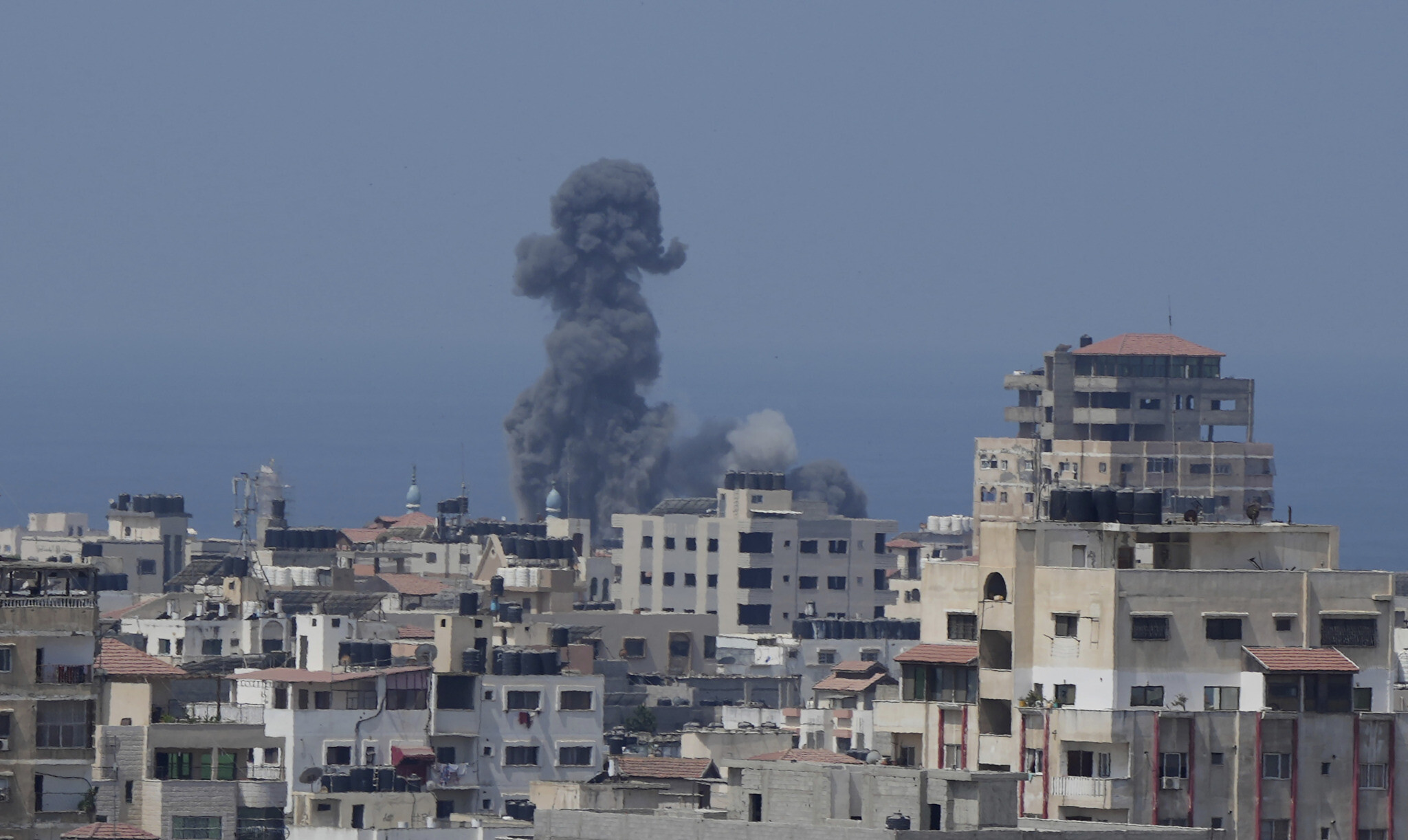
Smoke rises after an Israeli air strike in Gaza City on August 6, 2022. Israel has been carrying out strikes on terror targets in the enclave as rockets are fired toward Israeli communities. (AP Photo/Hatem Moussa)
However, at around noon on Saturday, rocket sirens sounded for the first time in the central city of Modiin and other nearby towns.
It was not clear if Islamic Jihad had limited capabilities for major attacks on more distant cities after Israel’s airstrikes, or if it had made a conscious decision not to escalate further.
The Interior Ministry announced that a number of beaches in southern Israel — Rishon Lezion, Ashkelon, Ashdod, Palmachim, Nitzanim, and Zikim — were closed due to the rocket fire from Gaza.
While there was no official instruction, multiple residents of towns close to the Gaza border traveled north in an attempt to keep out of harm’s way.
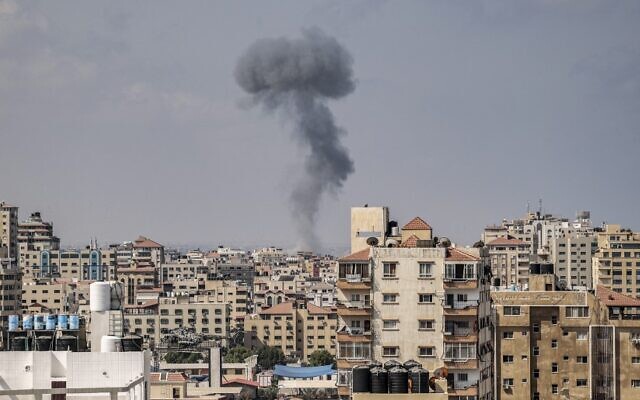
Smoke rises after an Israeli air strike in Gaza City on August 6, 2022. Israel has been carrying out strikes on terror targets in the enclave as rockets are fired toward Israeli communities (Mahmud Hams/AFP)
The IDF estimated it had killed around 10 Islamic Jihad terror operatives in its airstrikes on Gaza, but also said that two or three uninvolved Palestinians had been killed.
The Hamas-run health ministry confirmed that at least 11 people had been killed, including a five-year-old girl, and 80 others wounded.
Israeli leaders said the airstrikes were necessary after the group refused to back down from its intentions to carry out attacks on the Gaza border. Along with Jabari, the IDF also said it targeted the head of PIJ’s anti-tank guided missile array and several squads preparing attacks.
Islamic Jihad had been threatening since Tuesday to attack — to reinforce its demand that Israel release its West Bank commander, Bassem Saadi, who was arrested in an IDF raid in Jenin on Monday — causing days of road closures and community lockdowns in areas near the Gaza border under immediate threat.
The IDF meanwhile said Saturday that troops arrested 20 suspects in pre-dawn arrest raids across the West Bank, including 19 Palestinians affiliated with Islamic Jihad.
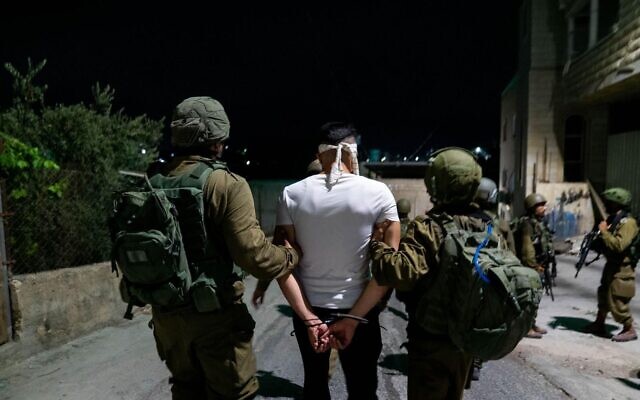
Israeli security forces arrest a terror suspect in the West Bank, August 6, 2022. The army said it arrested 20 Palestinians, including 19 affiliated with Palestinian Islamic Jihad in towns and cities in the West Bank. (IDF)
Hebrew and Arabic-language media reports have indicated that Egypt had been attempting to mediate between the sides in recent days, but failed to convince Islamic Jihad to back down.
Israeli officials said that the Gaza operation was targeting PIJ specifically, hoping to keep Hamas largely out of the conflict as it did during a 2019 flare-up after the killing of a previous Islamic Jihad leader, Abu al-Ata.
As of Saturday morning, Hamas appeared to indeed be staying out of the fight for the time being. Though its leaders voiced fiery condemnation of Israel’s actions, the Gaza-ruling terror group did not say it would take part in the fight, nor did it participate in the initial rocket attacks.
In a statement to the media at IDF headquarters in Tel Aviv just as the rocket barrage began on Friday evening, Prime Minister Yair Lapid said the campaign “will take as long as it takes,” and that “this government has a zero-tolerance policy for any attempted attacks – of any kind – from Gaza towards Israeli territory.”
“The directive the security forces received from us was clear: Israel will not sit idly by when there are those who are trying to harm its civilians,” he said. “Terrorist organizations will not set the agenda in the area adjacent to Gaza, we will not tolerate any threat against our civilians.”
“Today’s activity in Gaza was against concrete threats which disrupted daily routine in southern Israel. Israel isn’t interested in a wider conflict in Gaza, but will not shy away from one either,” he said.
In English remarks, he added: “Islamic Jihad is an Iranian proxy that wants to destroy the State of Israel and kill innocent Israelis. The head of Islamic Jihad is in Tehran as we speak.”
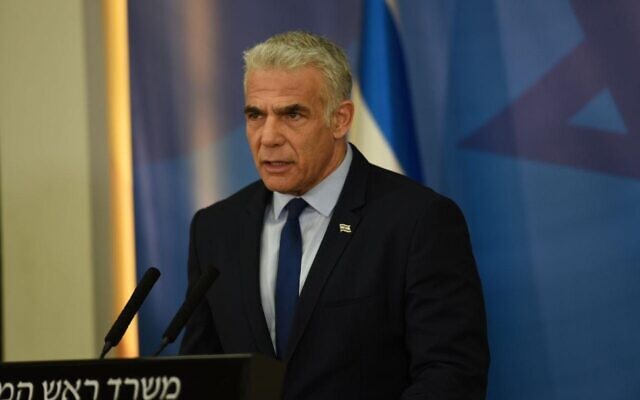
Prime Minister Yair Lapid speaks about the IDF operation in Gaza, August 5, 2022. (Kobi Elkatzur/GPO)
Speaking after Lapid, Gantz stressed that Israel was not targeting Gaza in general or ordinary Gazans, but rather “those who are responsible for the deterioration.” He stressed that Islamic Jihad was responsible for the damage to the security and the economy of Gazans.
“We will destroy those who threaten us,” he warned.
On Friday night, Gantz held a phone call with US Defense Secretary Lloyd Austin and updated him on the IDF’s efforts. The US has voiced support for Israel’s right to defend itself while calling for calm.
The military said it had deployed the Iron Dome air defense system near Tel Aviv, Jerusalem and Beersheba, as it anticipated retaliation from Islamic Jihad in the form of rocket attacks.
The military said a “special situation” had been declared on the homefront, up to 80 kilometers from Gaza — an area extending as far north as Tel Aviv. Residents in areas close to the border were instructed to remain close to bomb shelters, and in the Lachish and central Negev areas gatherings were restricted.
Public bomb shelters were opened in Tel Aviv and the southern city of Beersheba, following instructions by the IDF’s Home Front Command.
The IDF, meanwhile, began to call up reservists to bolster its Southern Command, Home Front Command, air defense array and combat troops in the event of further escalation. Gantz approved calling up as many as 25,000 reservist troops, his office said.
